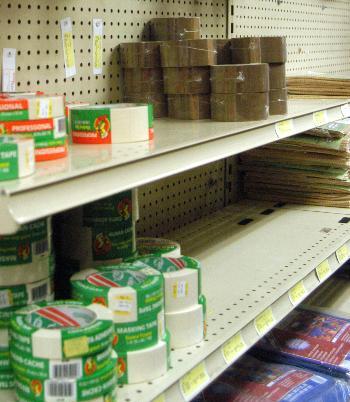
News
‘Deal with the Devil’: Harvard Medical School Faculty Grapple with Increased Industry Research Funding

News
As Dean Long’s Departure Looms, Harvard President Garber To Appoint Interim HGSE Dean

News
Harvard Students Rally in Solidarity with Pro-Palestine MIT Encampment Amid National Campus Turmoil

News
Attorneys Present Closing Arguments in Wrongful Death Trial Against CAMHS Employee

News
Harvard President Garber Declines To Rule Out Police Response To Campus Protests
Colleges May Be Targets for Terror

It’s hard to find a roll of duct tape in Harvard Square these days.
The code orange level of terrorist alert announced by the U.S. government last Friday has prompted a nationwide shopping spree on supplies that might be useful in case of a biological or chemical attack.
On Tuesday, the FBI announced that colleges and universities could be “soft” targets for terrorist attacks.
Colleges are possible targets of attacks because they are poorly defended, host large events and contain materials for nuclear weapons, according to an article posted on The Chronicle of Higher Education’s website on Tuesday.
But Harvard University Police Department (HUPD) spokesperson Steven G. Catalano noted that universities were far from alone on the list of “soft” targets.
“HUPD was concerned that the article gave this impression that colleges and universities were at immediate risk,” Catalano said. “In fact, they were listed as one of many soft targets that included banks, churches and shopping malls.”
Nonetheless, Square residents continue to stock up on protective supplies including duct tape which the Government’s Department of Homeland Security says can be used in combination with plastic sheeting to seal windows, doors and vents in the case of a biological terror attack.
Dickson Brothers—the Square’s sole hardware store—has sold out of both supplies.
Store Manager Ned P. VerPlanck said that although duct tape and plastic sheeting inventories have been depleted because of the heightened alert, more supplies will be in stock tomorrow afternoon.
“It’s because of the newspaper articles and the news on TV,” VerPlanck said. “[The rush] started on Tuesday, with plastic here and a roll of tape there, we sold out.”
VerPlanck said one customer bought “quite a bit” of tape to send across the country.
Yardland Security
Catalano said Harvard is prepared to respond to any attack on the University, but he says there no signs that such an attack is imminent.
“Harvard University has very good relations with local, state and federal law enforcement agencies,” Catalano said. “We are in constant contact in order to assess any risk to Harvard. To date, no credible threats have been made against the University.”
House superintendents said they have been apprised of the heightened warning.
Cabot House Superintendent Gene G. Ketelhohn said there are emergency plans in the event of a necessary evacuation, but that in the meantime students should be as alert as HUPD.
“The security guards will be extra vigilant, and students should have the same kind of concern,” Ketelhohn said.
He emphasized the importance of questioning those who enter Houses without Harvard ID and instructed students to avoid allowing “piggybacking”—letting individuals enter behind students who have already swiped.
Paul J. Hegarty, Leverett House superintendent, agreed that awareness is key to student safety.
“This is a time when nothing can be taken for chance. We’re taking [the alert] very seriously,” Hegarty said. I’m not going to live in fear, but I try to be safe and aware.”
Both superintendents said that if students notice luggage or suspicious packages left around campus, they should report it immediately to HUPD.
“One thing that students can do is to educate themselves about the issues of preparedness and planning,” said Catalano.
Catalano said students can consult the Department of Homeland Security’s Website to find out “how to be more prepared and how to deal with these difficult times.”
In addition buying duct tape and plastic sheeting, the Department of Homeland Security recommends assembling a disaster kit that contains a battery-powered radio, a first-aid kit, batteries, nonperishable food and water.
Other colleges have increased their security in response to the FBI warning. Princeton University issued a statement on their Web site, and Syracuse University plans to carefully patrol a football game against Notre Dame tomorrow that will attract more then 30,000 fans.
—Staff writer Hana R. Alberts can be reached at alberts@fas.harvard.edu.
Want to keep up with breaking news? Subscribe to our email newsletter.
